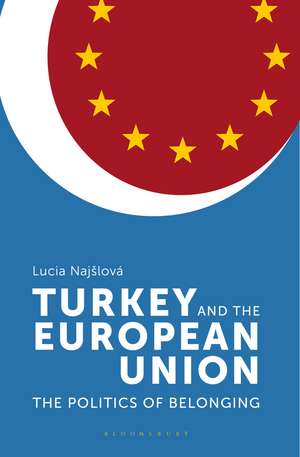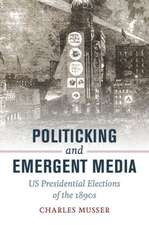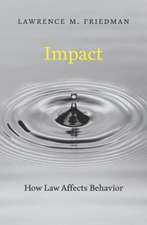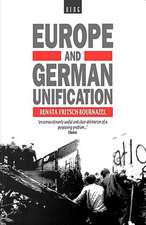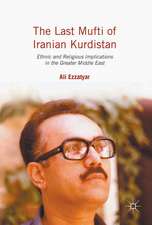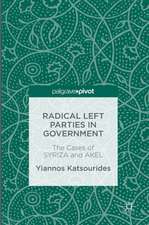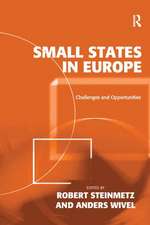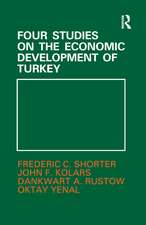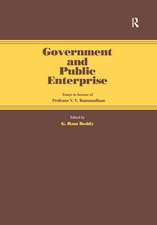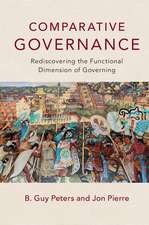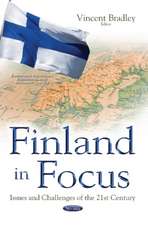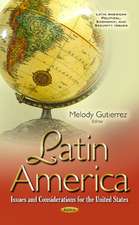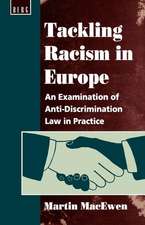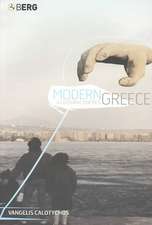Turkey and the European Union: The Politics of Belonging
Autor Lucia Najšlováen Limba Engleză Hardback – 24 feb 2021
| Toate formatele și edițiile | Preț | Express |
|---|---|---|
| Paperback (1) | 197.05 lei 6-8 săpt. | |
| Bloomsbury Publishing – 24 aug 2022 | 197.05 lei 6-8 săpt. | |
| Hardback (1) | 568.40 lei 6-8 săpt. | |
| Bloomsbury Publishing – 24 feb 2021 | 568.40 lei 6-8 săpt. |
Preț: 568.40 lei
Preț vechi: 815.70 lei
-30% Nou
Puncte Express: 853
Preț estimativ în valută:
108.77€ • 112.87$ • 90.92£
108.77€ • 112.87$ • 90.92£
Carte tipărită la comandă
Livrare economică 17-31 martie
Preluare comenzi: 021 569.72.76
Specificații
ISBN-13: 9781838602666
ISBN-10: 1838602666
Pagini: 216
Dimensiuni: 156 x 234 x 19 mm
Greutate: 0.48 kg
Editura: Bloomsbury Publishing
Colecția I.B.Tauris
Locul publicării:London, United Kingdom
ISBN-10: 1838602666
Pagini: 216
Dimensiuni: 156 x 234 x 19 mm
Greutate: 0.48 kg
Editura: Bloomsbury Publishing
Colecția I.B.Tauris
Locul publicării:London, United Kingdom
Caracteristici
Draws on various interdisciplinary strands of research including studies of migration, literatures of recognition and political geographies of modernity.
Notă biografică
Lucia Najslova is Lecturer in European Politics at Charles University, Prague, Czech Republic.
Cuprins
IntroductionSection One: The Clock, the Compass and the TypewriterChapter One: Belongings We Chose and Those that We do NotChapter Two: Europe Becoming an InstitutionChapter Three: Turkey: Reflections on Becoming (Fast Version)Section Two: Recognitions and RealismsChapter Four: Yes, Still Talking About AccessionChapter Five: Your Comment Is Not RelevantChapter Six: For Turkish Cypriots, the Summit will be Web-StreamedSection Three: Refugees and CrisesChapter Seven: They're Speaking Like My PresidentChapter Eight: Can We Trust Turkey? The Czechs in the Making of the EU-Turkey Refugee DealCoda: Notes on Stillness, Acceleration and SovereigntyIndex
Recenzii
Lucia Najslova's book skilfully connects common understandings about what went wrong in the EU-Turkey relationship and the nuances of how this is perceived in various European quarters. It takes the reader on a journey, from "civil society dialogues" to Czech science fiction series, providing a refreshing outlook on the subject and a must read for all those interested in understanding what is an will remain one of the cardinal relationships in the broader European space.
Turkey and the European Union provides a brilliant perspective to our understanding, or better, misunderstanding of Turkey-EU relations especially during a period when 'Turkey's membership is not realistic' dictates the exchanges on the relationship. As Najslová rightfully states, Turkey is there on the map and the option of Turkey not to be anything - either a member or a partner - cannot be a part of the scenario.
This is an extraordinary book which explores the relations between the European Union and Turkey in a refreshingly unorthodox way. The framing of the analysis by politics of exclusion gives the book an additional twist. It suddenly makes the book relevant not only for those scholars dealing with Turkey or European integration, but more generally for everyone who is interested in inequality and exclusion in the study of global politics.
Najslova's lively attention to detail systematically uncovers inconsistencies in dominant assumptions of fixed entities, interests and institutions. Focusing on core themes of community, temporality and difference, she interrupts dominant narratives and shows how understandings of belonging are constructed through and, crucially, alongside structures of hierarchy.
Turkey and the European Union provides a brilliant perspective to our understanding, or better, misunderstanding of Turkey-EU relations especially during a period when 'Turkey's membership is not realistic' dictates the exchanges on the relationship. As Najslová rightfully states, Turkey is there on the map and the option of Turkey not to be anything - either a member or a partner - cannot be a part of the scenario.
This is an extraordinary book which explores the relations between the European Union and Turkey in a refreshingly unorthodox way. The framing of the analysis by politics of exclusion gives the book an additional twist. It suddenly makes the book relevant not only for those scholars dealing with Turkey or European integration, but more generally for everyone who is interested in inequality and exclusion in the study of global politics.
Najslova's lively attention to detail systematically uncovers inconsistencies in dominant assumptions of fixed entities, interests and institutions. Focusing on core themes of community, temporality and difference, she interrupts dominant narratives and shows how understandings of belonging are constructed through and, crucially, alongside structures of hierarchy.
